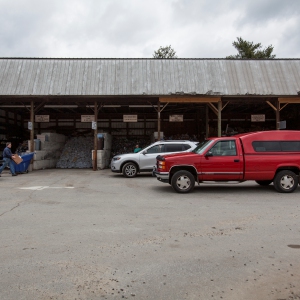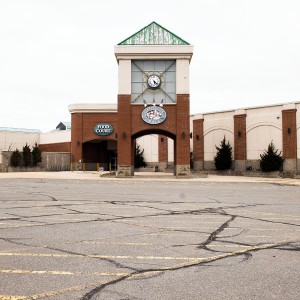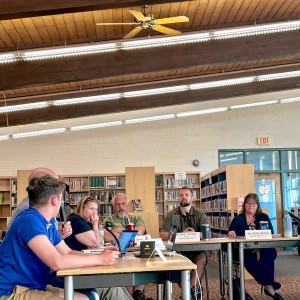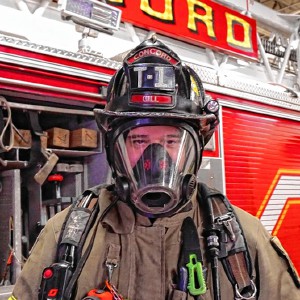A life-changing moment
| Published: 06-01-2023 3:47 PM |
If Keith Tuttle could go back to April 11, 2019, he would put his helmet on before heading out for a motorcycle ride. He can’t change his choice on that day, so he’s doing the next best thing: Telling as many other motorcyclists about what happened to him as he can, so they don’t have to go through what he — and his family — have to endure.
Tuttle, 51, lives in Franklin, and for most of his adult life he was a public employee. He ran the warehouse for Merrimack County, managing the purchasing and inventory needs for the county nursing home, the sheriff’s department, county attorneys and commissioners.
“I purchased for everyone under the sun, I apparently did very well at it,” Tuttle said.
He grew up “all over the country,” and graduated from high school in York, Maine. He studied to become an architect, but said he became “irritated” by anything involving computers. He found an outlet for his skills with his job working for Merrimack County, and he threw himself into it. It was a stressful job, and he said he often came home from work only to crack open his laptop and continue working on whatever problem was left unsolved at the end of the day.
His release, his escape, came in the form of two wheels and a motor.
He discovered motorcycling in 2016, when he took a friend’s Suzuki GSX-R out for spin. That bike, described by its manufacturer as an “ultra-high-performance motorcycle,” offered felonious velocity with a flick of the wrist, which Tuttle didn’t trust himself with. Instead, he bought himself a Yamaha V-Star — a cruiser — and it became a part of his lifestyle.
Today, he said he has a “love-hate” relationship with riding.
“It’s something that I loved so dearly in my life, I did it for such a brief period in my life, and I did it whenever I could,” Tuttle said. Yet, it very nearly cost him his life.
Article continues after...
Yesterday's Most Read Articles
 Hopkinton tries to nab out-of-town trash bandits
Hopkinton tries to nab out-of-town trash bandits
 UNH faculty and students call on university police chief to resign following his alleged assault on a student
UNH faculty and students call on university police chief to resign following his alleged assault on a student
 Steeplegate project to reopen to public comment as developer seeks to reduce required parking
Steeplegate project to reopen to public comment as developer seeks to reduce required parking
 Monitor Way developer seeks $4.67 million from city for proposed new road
Monitor Way developer seeks $4.67 million from city for proposed new road
 Northeast Coffee Festival comes to Concord this weekend
Northeast Coffee Festival comes to Concord this weekend
 NH Senate panel frowns on bill to ease vehicle inspection requirements
NH Senate panel frowns on bill to ease vehicle inspection requirements
Tuttle doesn’t recall what happened on that day four years ago, but his wife said she will never be able to forget.
Jen Tuttle, Keith’s wife, describes April 11, 2019, as “a day that is sharply burned into my memory.” It was a nice day, one of those April days that previews the fair season ahead. Jen was running late and had plans to meet Keith in Tilton to take a ride on his motorcycle. He wasn’t there, though, so she concluded he must have intended to meet her at their home instead, so she headed toward Franklin.
“Then, as I approached McDonald’s in Franklin, traffic came to a complete halt. An ambulance sped by going the opposite direction. I tried to call Keith but had to leave a message that I was going to be even more late,” she wrote in an email.
“Ever so clearly I recall ‘the moment,’ ” she continued. “Traffic began moving very slowly. My phone rang and I answered, just as my eyes were peering at Keith’s bike, my son-in-law is telling me that he thinks that Keith has been in an accident. At that very moment I was not able to keep up with time; like there was no gravity and I couldn’t get moving.”
Jen wrote it felt like it took an impossible amount of time to get to the hospital — Keith was taken to Concord, because emergency responders didn't think he could wait for a medical airlift to Dartmouth-Hitchcock. When she arrived, she was brought to a private waiting room, “and saw all of my kids sitting there, frantically bawling.”
Keith was alive, but the rest of the news was dire. He had suffered many injuries in the collision, but the most concerning were his brain injuries. He had two brain bleeds, and the swelling was causing a dangerous amount of pressure on his brain tissue.
“The surgeon met with me briefly and stated that he was alive; however, I needed to caution any optimism,” Jen wrote. “The next 72 hours would be critical to determine his chance of survival.”
The next week was a “hurricane of emotions” for Jen and her children, whom Keith had adopted. One moment it looked promising, then his vitals would take a nose-dive and the family would despair. Finally, after nearly two weeks, he was stable enough to consider moving to a rehabilitation facility, which occurred April 26.
Keith, who had been in an induced coma, was given a daily routine of therapies. He needed to relearn how to speak, as well as how to perform other basic tasks, before he go home. That took another month, but he was finally released at the end of May.
As Keith, Jen and the rest of their family settled in to what was now their new life, they realized something. Although Keith’s body had recovered, he wasn’t the same person — his personality and character were different. Jen wrote that he could remember details about his past, but he was not emotionally connected to them — it was as if he was remembering someone else’s life.
“We have all struggled with that particular loss. We have made our way through a grief that kind of lingers on without a solid closure. Each year we are able to cope with that grief a little better in our understanding that we have to let go of who he was and embrace and support the person that he now is. Keith struggles knowing that he is a different person and how that affects us.”
Jen wrote that the world, even the familiar streets and storefronts of their hometown, look foreign to them now, and their daily lives, including their relationships with each other, with their children and their neighbors, are all fundamentally different.
“We are four years old in this world but we navigate it together and we have leaned on each other navigating through it,” she wrote.
‘I stopped at a stop light. That’s all I remember’
The V-Star was a new toy, purchased on his birthday that year, and the day of the accident was only the third time he had taken it out. Keith made a deal with Jen that he was going to start wearing a helmet when he rode. However, he was in a rush to ride that afternoon, grabbed his keys and left the helmet behind.
“Biggest mistake of my life,” he described in a three-minute video he made to help tell his story.
He remembers heading up Central Avenue in Franklin, toward Tilton. Near the McDonald’s, “I stopped at a stop light. That’s all I remember.”
He still isn’t certain about what happened after he stopped — some witness accounts he’s collected throw doubt on the official report from the accident scene — but he said that’s beside the point.
“I’m alive,” Keith said. “Now I have a purpose: Not let people go through what I went through.”
It seems likely that he was struck from behind, which sent his body ricocheting off various fixed obstacles until he came to rest in a front yard. That’s all after-the-fact, though, to Keith.
“I don’t know what happened during the accident. All I know is it was my choice” not to wear a helmet, he said. That was four years ago, and in the time since, he’s been comatose, undergone major surgery, spent weeks in a rehabilitation facility, and hasn’t been able to return to work. He also has to bear the knowledge that he depends on others to get through each day, and that’s the part that stings the most.
“What happened to me, I did,” Keith said. “But what has happened to my family outweighs everything that I went through. ... They have to calm me, because all I want is what I lost. And I break down every day, no matter where I am.”
Keith used to be a quiet person, someone who shied away from conversation. Now he engages everyone he can, especially if he sees them about to get on a motorcycle without a helmet. He has two messages for them: Just because they have the choice to ride without a helmet doesn’t mean they should, and if they choose to forgo that protection, it isn’t only on their life they’re gambling.
“My family went through living hell,” Keith said. He figures he beat the odds and survived, and his payment for that privilege is to tell people what he wishes he had considered before.
“If you can’t do it for yourself, look at the people in your life. They are going to be the people who pay for what has happened.”
These articles are being shared by partners in The Granite State News Collaborative. For more information visit collaborativenh.org.


 Following budget cut, Pembroke revisits future of elementary school re-build
Following budget cut, Pembroke revisits future of elementary school re-build Granite Geek: Free government software for taxes – what could go wrong? (Not much, as it turns out)
Granite Geek: Free government software for taxes – what could go wrong? (Not much, as it turns out) To snuff out cancer, NH firefighters seek regular screenings
To snuff out cancer, NH firefighters seek regular screenings New Hampshire jury finds state liable for abuse at youth detention center and awards victim $38M
New Hampshire jury finds state liable for abuse at youth detention center and awards victim $38M
